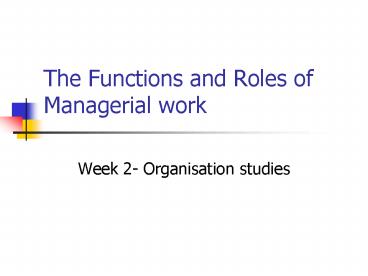The Functions and Roles of Managerial work - PowerPoint PPT Presentation
1 / 24
Title:
The Functions and Roles of Managerial work
Description:
To understand the Roles and functions of managers. To gain an understanding of the role of management in ... Figurehead. Carries out some symbolic activities ... – PowerPoint PPT presentation
Number of Views:1330
Avg rating:3.0/5.0
Title: The Functions and Roles of Managerial work
1
The Functions and Roles of Managerial work
- Week 2- Organisation studies
2
Learning outcomes
- To understand the Roles and functions of managers
- To gain an understanding of the role of
management in meeting the organisations goals
3
Levels of Management
- Corporate level
- Middle level
- Front line
- Non-managerial staff
4
Functions of Managers
- Last week-
- Function of management Generally condensed down
to - Planning
- Organising
- Leading
- controlling
5
Planning
- Organisations are Goal Directed
- Therefore there needs to be a control mechanism
to determine the direction to be followed in
order to attain the goal - Therefore managers must
- Define and clarify goals
- Establish strategies in order to reach the goals
- Develop plans to co-ordinate activity
6
Organising
- Organisations by definition involve several
people - Therefore a crucial function for managers is to
determine what needs to be done, how it will be
done and who does it - Therefore managers must
- Divide labour
- Align tasks
7
Leading
- Directing and motivating the parties and on
occasion resolving conflicts - This involves
- Influencing
- Motivating
- Communicating effectively
- Dealing with employee behaviour
8
Controlling
- Monitoring activities and ensuring organisational
targets are met and followed - This involves
- Evaluating
- Monitoring
- Realigning
- Comparing
9
The management process
- There is no simple division of stages
- All four functions can occur simultaneously
- The Management process refers to the ongoing
process of managers carrying out the functions in
order to interact with the organisation and its
environment
10
Roles of Managers
- A second school of thought argues that rather
than studying the functions of managers, in order
to understand management the Roles are what
should be emphasised. - Leading theorist on this area is Mintzberg
- A second is Stewart
11
Mintzberg Roles of Managers
- Study of CEOs, and review of other observational
studies - Identified 10 managerial roles divided into 3
categories - Interpersonal roles
- Informational roles
- Decisional roles
12
Interpersonal Roles (Mintzberg)
- Figurehead
- Carries out some symbolic activities
- Greeting visitors, appearing in promotional
activities - leader
- Responsible for motivation of subordinates
- Overseeing the activities of subordinates
- Liaison
- Acts as a medium of exchange between the
organisation and environment
13
Informational Roles (Mintzberg)
- monitor
- Gathers information in relation to the
organisation and its tasks - Publishing reports
- disseminator
- Transmits information around the organisation
- Holding meetings
- Spokesman
- Transmits information to outsiders
- Gives information to the media
14
Decisional Roles (Mintzberg)
- entrepreneurial
- Searches for opportunities to improve
- disturbance handler
- Carry out corrective actions
- resource allocator
- Makes or approves decisions to allocate resources
- Negotiator
- Represents the organisation at both internal and
external negotiations
15
Activities of Managers (Knotter)
- Agenda Setting (aims, objectives, plans,
strategies, ideas, decisions, prioritising
activities) - Network Building (establishing and maintaining
contacts to assist the successful achievement of
agenda)
16
Stewarts Model of Managerial Work
- Stewart (1976), developed a model for
understanding managerial work and behaviour - Demands - which involve much contact with
subordinates, peers and supervisors (meeting
criteria, complying with procedures). - Constraints resource limitations, legal and
trade union constraints, technology,
structure,culture, attitude - Choices changes to work practices, locations,
work sharing, participation in public or
organisational activities.
17
Management Skills
- Katz analysed the skills used by different levels
of managers - Technical skills
- Human skills
- Conceptual skills
- Different levels of management require different
levels
18
Management Skills
- Katz found all levels of management required high
levels of human skills - Conceptual skills were decreased in importance
the closer the level of managers get to the
front line - Technical skills decreased in importance the
closer the level of management was to the
corporate level
19
Kotter (1982) - Management Networks
- Based on an in-depth survey of 15 successful
general managers found - large proportion of time spent interacting with
others, internally and externally this provides
information and facilitates dissemination of
inormation topics covered include those relevant
to formal task agendas and also managers own
personal goals and agendas
20
Kotter (1982) - Management Networks
- This process results in the creation of
managerial networks which are used - to facilitate both agendas
- to gather relevant information to implement
formal tasks agendas
21
Carroll and Gillen (1987)
- managers work from a goal agenda
- have tentative plans about how to get there
- these change with new information and environment
changes - detailed planning is constrained by
interdependencies and other constraints - must also be concerned about other managers goals
22
Carroll and Gillen (1987)
- organisation imposes a framework of controls and
coordination - manager has own agenda, independent of the
organisation - SO - manager must allocate time to
23
Carroll and Gillen (1987)
- organisations formal plans and goals
- goals and plans of others in the organisation
- own plans and goals
- In addition, he / she has to find time for
opportunities and threats which arise both
internally and externally
24
Tutorial Questions
- What did Taylor see as the principles of
scientific management? - How does Mintzberg classify the roles played be a
manager? - What are the most important skills a manager
requires?































